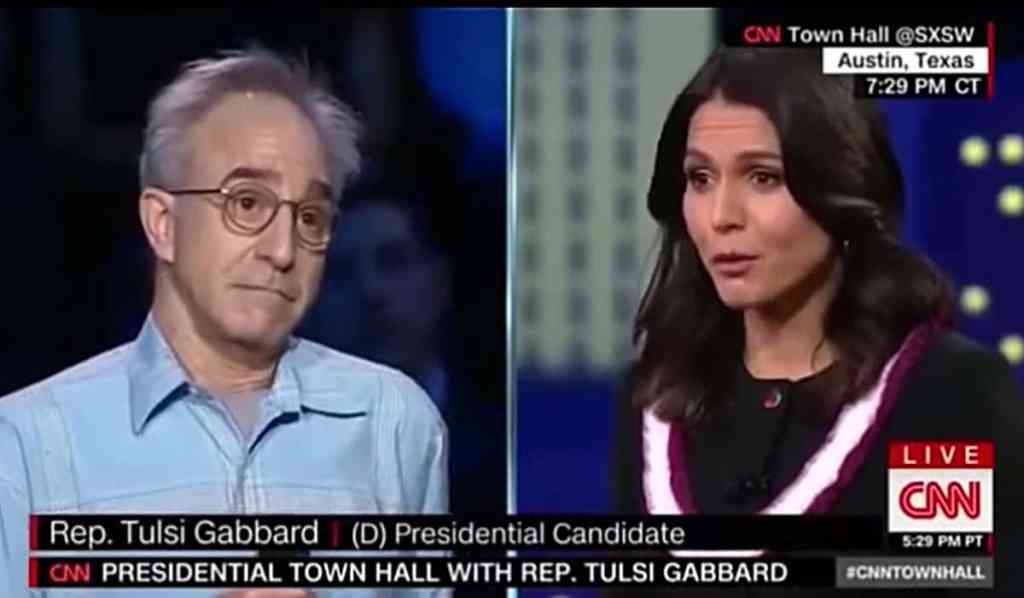
Appearing at a CNN Town Hall on Sunday night, Democratic presidential hopeful Rep. Tulsi Gabbard (D-HI) was asked by an audience member to explain her past views opposing gay rights, and her support of gay conversion therapy.
Gabbard said she never “personally never supported any kind of conversion therapy. I never advocated for conversion therapy. And frankly, I didn't even know what conversion therapy was until just the last few years.”
“I was raised in a very socially conservative home,” she added. “My father is Catholic. He was a leading voice against gay marriage in Hawaii during that time. Again, I was very young, but these are the values and beliefs that I grew up around.”
Gabbard said that deploying to Middle East changed her views on gay rights because she “saw firsthand the negative impact of a government attempting to act as a moral arbiter for their people…It caused me to confront that contradiction…but also how that contradicted some of the values and beliefs that I grew up with.”
She added: “I also served with gay and lesbian and trans service members and we became very good friends and knew in the most deep and visceral way that I would give my life for any one of them, and that they would do the same for me. Race or religion or orientation — these were things that didn't matter, because we were focused on our mission of serving.”
Gabbard released a video in January apologizing for her past views and statements about LGBTQ people, and work for anti-gay groups.
That month, a CNN investigation revealed Gabbard's close ties with the anti-gay groups run by her father, when she was in her late teens: ‘Gabbard's past positions can be traced back to the early 2000s, when she first sought public office.During her run for state legislature in 2002, Gabbard told the Honolulu Star-Bulletin, “Working with my father, Mike Gabbard, and others to pass a constitutional amendment to protect traditional marriage, I learned that real leaders are willing to make personal sacrifices for the common good. I will bring that attitude of public service to the legislature.” The quote, which CNN's KFile found during a review of Gabbard's early career, shows how closely she aligned herself with her father's mission at the time. Gabbard's father ran The Alliance for Traditional Marriage, a political action committee aimed at opposing pro-gay lawmakers and legislation that organized and spent more than $100,000 to pass an amendment in 1998 that gave the Hawaii state legislature power to “reserve marriage to opposite-sex couples.” The amendment to the state's constitution passed.'
CNN added, of Mike Gabbard: ‘Gabbard's father Mike was a prominent anti-gay activist in Hawaii. He was also the director of Stop Promoting Homosexuality and also served on the steering committees of the National Campaign to Protect Marriage and the Hawaii-based coalition, Save Traditional Marriage. He also once hosted an anti-gay radio show, Let's Talk Straight Hawaii. The Alliance for Traditional Marriage called homosexuality “unhealthy, abnormal behavior that should not be promoted or accepted in society.”'
In 2013, Gabbard signed an amicus brief supporting Edie Windsor's battle to defeat the Defense of Marriage Act (DOMA).
Gabbard was the youngest woman elected to the Hawaii state legislature at age 21, and is the first Samoan-American member and the first Hindu member of Congress.
Out Rep. Sean Patrick Maloney (D-NY) came to Gabbard's defense.
The Hill reported: ‘Maloney, who is openly gay, said in a statement that he's experienced discrimination first-hand, and argued those who work against equality “carry that stain and must be held accountable.” … “But I also understand how important it is that we encourage people to admit their error, grow and evolve, as much of the country has done over the last two decades,” he said. “That is exactly what Tulsi Gabbard has done. She recognized the fault in her past views and the pain she was causing, and she has apologized.” Maloney called Gabbard a “strong ally and close friend in Congress,” and said the LGBTQ community should “not confuse forgiveness with weakness nor substitute recrimination for healing.”'



